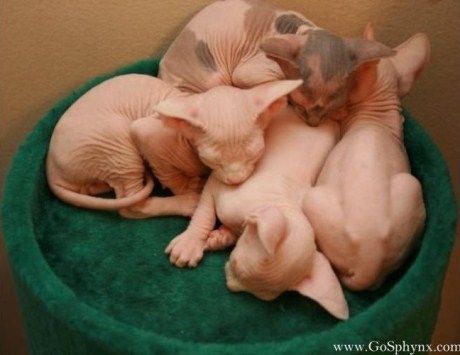Symptoms of Sphynx Cat Diseases
Sphynx cat diseases that owners should watch for

When we feel pain in any part of our body, we are able to let other people know. We can communicate to someone that we need help. When our pets feel pain, they have no way of letting us know. Sphynx cat owners can look out for any changes in the pet's behavior that may indicate signs of a problem. There are a couple of feline diseases sphynx cat owners should be aware of, and should watch for any symptoms.
The leading cause of feline death is a disease called feline infectious peritonitis, or FIP. FIP happens when the cat has a coronavirus infection. One of the difficulties in figuring out if a cat has FIP is that the symptoms of the disease, such as diarrhea and other gastrointestinal problems, are common to other ailments.
Feline Immunodeficiency Virus, or FIV, is akin to HIV, Human Immunodeficiency Virus. FIV doesn't typically show any symptoms until stage three of the disease. Stage three is usually when the cat's immune system begins to weaken. As the disease progresses, there may be dermatological symptoms such as chronic gingivitis, and chronic abscesses. This disease lasts through the cat's life and progresses slowly.
Feline Leukemia Virus, or FeLV, is a retrovirus that can infect cats. FeLV causes non-cancerous and cancerous diseases that are fatal to cats. Symptoms of Feline Leukemia Virus include skin infections, poor coat condition, a loss in appetite, fatigue, weight loss, fever, seizures, and an avoidance of using a little box. A sphynx cat owner should look for signs of diarrhea, poor grooming, jaundice, and gingivitis, as these are also symptoms of FeLV. This virus is spread through the infected cat's saliva, urine, feces, and tears.
Another threat to your cat is worms, which is caused by a fungal infection and is spread through the fungal spores. The good news is that, this disease eventually clears up on its own. It may take a few months, and the recovery process may be helped by medication given by a veterinarian. A few indications that a cat has worms include a dark looking stool, diarrhea, and weight loss. Sphynx kittens who have worms may also exhibit a pot belly.
Feline diabetes is another disease that affects sphynx cats. A sphynx who is overweight most likely already has feline diabetes. Excessive thirst, excessive urination, and either rapid weight gain or rapid weight loss are signs of this disease. There is no known cause of feline diabetes, but there have been research studies showing a link between hormonal imbalance, pancreatic disease, and certain types of medication.
Most of the diseases above exhibit similar symptoms, such as vomiting, diarrhea, lameness in one leg that lasts for more than five days, blood in the urine or feces, loss of hair, seizure, heavy panting, and persistent gagging or coughing. A decrease in the cat's vision as well as heavy or labored breathing when the cat is resting are also symptoms of the diseases above.
When you take your cat into the veterinarian's office, be sure to describe any and all symptoms. The doctor will take samples of the cat's urine, blood, and stool. Once the test results come back, the veterinarian will prescribe the correct medication and treatment for your cat. Every cat is different as to how they respond to treatment. A treatment used on one cat, may not work for another.
By feeding your cat a nutritious diet, and keeping an eye on their behavior, your cat can live a long and healthy life. Providing your cat with fresh water, a clean litter box, proper grooming and enough exercise, will help ensure the health of your cat. One of the best ways to make sure your cat stays healthy, is to take him or her to the veterinarian for regular check ups.
Skipping any of the steps above may lead to certain diseases, and you'll notice a change in their behavior as a result. Doing nothing if your sphynx cat exhibits symptoms will not make the issue go away. Get advice from a veterinarian if you're concerned about the way your sphynx is behaving.
